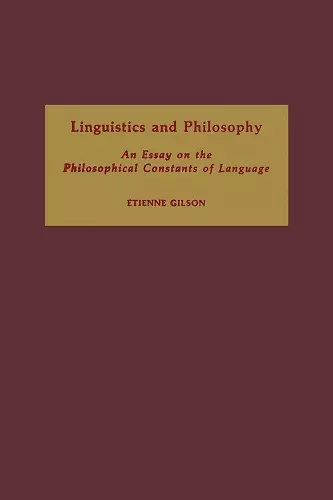Linguistics and Philosophy
An Essay on the Philosophical Constants of Language
Etienne Gilson author John Lyon translator
Format:Paperback
Publisher:University of Notre Dame Press
Published:31st Jul '17
Currently unavailable, and unfortunately no date known when it will be back
This paperback is available in another edition too:
- Hardback£83.00(9780268012847)

This marks the first time Linguistics and Philosophy, published in France in 1969, has been translated into English. Here, philosopher Etienne Gilson examines linguistics—from Descartes to Derrida—as he argues for the irreducibility of thought to language. Reviewing the theories of figures such as Condillac, Mallarmé, de Saussure, and Vendryès, Gilson looks at the process whereby thought is translated into language, seeking to reestablish the notion of concepts as mediators.
The temptation of linguists to philosophize in such areas as the relationship of thought, language, and the world prompted Gilson to write Linguistics and Philosophy. In the introduction he does not claim to be a linguist, but rather a philosopher exercizing his option of selecting certain issues involving language that seem to be "philosophic constants."
Decidedly philosophical in his approach, Gilson examines the way in which words, meanings, and languages grow continually and creatively, an inextricable part of life in society. He also explores our ability to construct abstract thoughts that point to an immaterial power of human beings, and he laments the degeneration of modern language brought about by radio and television broadcasters, especially in connection with neologistic and linguistic borrowing from other languages.
We are currently observing the deterioration of language through the spoken word. In this fascinating work, Gilson demonstrates that the linguist cannot be indifferent to this occurrence.
"Gilson has attempted to speak from the tradition of Aristotle and Thomas Aquinas to contemporary philosophers, not only to linguists, to whom this book is principally addressed, but to all, such as analysts, who give great attention to language. He makes . . .an argument that is well worth hearing. Philosophers should take from this book not only the principal argument . . . but also the implied judgement of the place of the philosopher in science. Gilson treats linguistics as a science that stands in need of philosophical reasoning in order to perform its proper scientific function. Too often . . . the philosopher's job is thought to be one of commenting on the scientist's work after the scientist's work has been done in a vacuum completely free of any philosophical impurity. . . . The scientific project is not a project separate from philosophy, but is a thoroughly philosophical project from beginning to end, although this fact is not always adverted to by the scientists. . . . Gilson has given in this book . . . excellent evidence of how the philosopher should work with scientific evidence to further the pursuit of truth, which is at once scientific and philosophical. — Canadian Philosophical Review
"This book may be described as a hymn to thought, an elegant, powerfully argued, sometimes moving, always persuasive defense of being—against the abstractions of modern science." —Christian Science Monitor
ISBN: 9780268160531
Dimensions: 229mm x 152mm x 13mm
Weight: 345g
230 pages